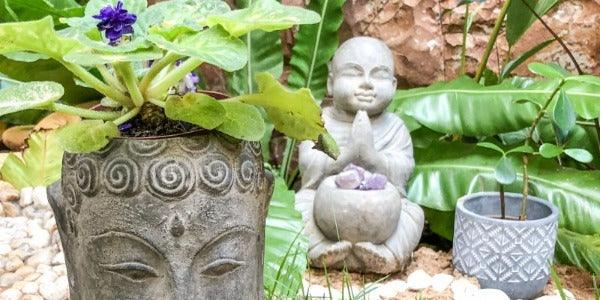If you close your eyes and imagine a place of refuge in your home to connect with yourself, nature will probably be at the forefront of your thoughts. And if it's not the sun's rays invading a peaceful environment with its natural light or potted plants and flowers making small spaces more valuable, how do you surround yourself with comfort without having to leave your home? How do you bring zen into everyday life to inspire your practices?
Taking this concept as a guide, we gathered elements that are significant in Buddhist and Hindu culture - charmingly incorporated in the figures of a Monk , Buddhas , Shiva and Ganesha - and created a landscape to motivate garden decoration with the simplicity and grandeur of Zen essence.

Symbols of Buddhism and Hinduism are valuable decorations for Zen gardens.
Zen is a Japanese word derived from the Hindu dhyana which means meditation . Its concepts were developed in India , are essentially associated with the Mahayana branch of Buddhism and were disseminated by the monk Bodhidharma in China during the 6th century AD - causing the foundation of the Ch'an tradition - and in Japan in the 12th century AD The practice of Zen presents distinct sects, of which Soto Shu and Rinzai stand out, who developed their own methods.
Despite the importance of sacred texts, deities and religious rituals, the essence of Zen philosophy is based on the immersive experience promoted by meditation by breaking the limits of thought to keep us present and make us see the state of things as it actually is. , no illusions. This precept bears on how the Buddha attained enlightenment and teaches that we all have a Buddha-nature , albeit one clouded by ignorance.

Creating zen environments is preparing the mind for immersive experiences through meditation.
From the 20th century on, Zen was shared around the world and incorporated into different areas to promote tranquility and well-being. Interior design was one of the most privileged due to its concepts, boosting the divine nature present in each element of the decoration as the keys to achieving physical spaces connected with the mental state or with the inner search, even if you don't practice yoga or meditation .
The construction of this space is not limited to just choosing an image of Buddha , a monk or a Hindu deity such as Shiva and Ganesh , but to produce a contemplative atmosphere that slows down and recharges energies by combining balance and relaxation with an elegantly simple aesthetic. and attractive. However, the more essential than ostentatious beauty of the Zen arts are great starting points for creating your temple and having a more purposeful experience.

Buddhas and Hindu gods are starting points for creating Zen decorations in the garden.
Nature is the soul of the environment, after all, there is no garden without the green vegetation providing freshness and the warmth of sunlight giving welcome. And here there is an invitation to go further, enjoying the naturalness of the stone sculptures (or in cement, referring to this component), which integrate the naturalness of the raw material with the artistic intervention, incorporating a powerful presence in the external area, albeit symbolic and subtle.
In this context, the iconography of Buddha sculptures enriches the garden decor with intentions. Each asana (posture) and mudra (hand gesture) of the Buddhist master conveys relevant teachings that set the tone for meditative practice. While the Fat Buddha or Hotei guides you to find abundance in generosity, for example, the Bhumisparsha Buddha invites you to understand that the light of truth is a means of accessing divine wisdom with enlightenment.

The iconography of Buddhas and monks values the zen garden with intentions and teachings.
The Zen garden alludes to beauty in essence, which manifests itself in the external environment effortlessly and with great subtlety, since the “ minimalist soul ” - the scarcity of complex visual or electronic elements - allows perception to be sharpened and to promote states of heightened consciousness . It is appropriate here to appropriate candlelight , especially at dusk, bringing the element of fire to energize moments of stillness, inspiring concentration, presence and creativity.
Colorful decorative lanterns protect the calming lights of the candles and offer chromatic harmony in the environment by resorting to cold colors to incorporate tranquility and grant the desired “peace of mind”. The same intention is provided by the garden fountains , which in addition to adding the water element, explore our senses with the relaxing sound of the “current”.

Candles and fountains bring the elements of fire and water to harmonize the space and aid meditation.
Except for the natural elements characteristic of garden decoration, it is worth benefiting from other senses, encompassing incense with censers and essences with rechôs to the aromas and beauty of flowers and plants. Try increasing vases with different sizes and materials, promoting texture , continuity and a feeling of comfort.
It is important to embrace the pure lines and subtlety of the garden to free yourself from the idea of perfection, after all "it is in subtlety that the limitless resides". Use the imperfection or "unfinished" aspect of the external environment to break with convention and make room for co-creation in everyday life. Modifying the shape of the space, rearranging the vegetation, removing or including decorative objects that connect you even more with yourself will also be a great exercise in meditation .

Modifying the garden with sculptures, fountains, vases and lanterns is a meditation practice.
Find arts at Art & Tune to make zen decoration a path that modifies your interior through the interiors and exteriors of the house. And notice in the details of the garden how the buddhic nature manifests itself in everything that exists, inviting you to silence the internal noises to calm the eyes and soul at the same time that an affectionate and welcoming space surrounds you.
Namaste!
Milene Sousa - Art & Tune
















